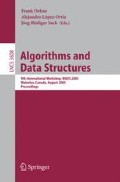Abstract
In this paper, we consider the weighted online set k- multicover problem. In this problem, we have an universe V of elements, a family \(\mathcal{S}\) of subsets of V with a positive real cost for every \(S \in \mathcal{S}\), and a “coverage factor” (positive integer) k. A subset {i 0, i 1,...} ⊆ V of elements are presented online in an arbitrary order. When each element i p is presented, we are also told the collection of all (at least k) sets \(\mathcal{S}_{i_p} \subseteq \mathcal{S}\) and their costs in which i p belongs and we need to select additional sets from \(\mathcal{S}_{i_p}\) if necessary such that our collection of selected sets contains at leastk sets that contain the element i p . The goal is to minimize the total cost of the selected sets. In this paper, we describe a new randomized algorithm for the online multicover problem based on the randomized winnowing approach of [11]. This algorithm generalizes and improves some earlier results in [1]. We also discuss lower bounds on competitive ratios for deterministic algorithms for general k based on the approaches in [1].
Access this chapter
Tax calculation will be finalised at checkout
Purchases are for personal use only
Preview
Unable to display preview. Download preview PDF.
References
Alon, N., Awerbuch, B., Azar, Y., Buchbinder, N., Naor, J.: The online set cover problem. In: 35th annual ACM Symposium on the Theory of Computing, pp. 100–105 (2003)
Andrec, M., Kholodenko, B.N., Levy, R.M., Sontag, E.D.: Inference of signaling and gene regulatory networks by steady-state perturbation experiments: Structure and accuracy. J. Theoretical Biology (in press)
Awerbuch, B., Azar, Y., Fiat, A., Leighton, T.: Making Commitments in the Face of Uncertainty: How to Pick a Winner Almost Every Time. In: 28th annual ACM Symposium on the Theory of Computing, pp. 519–530 (1996)
Berman, P., DasGupta, B., Sontag, E.: Randomized Approximation Algorithms for Set Multicover Problems with Applications to Reverse Engineering of Protein and Gene Networks. In: Jansen, K., Khanna, S., Rolim, J.D.P., Ron, D. (eds.) RANDOM 2004 and APPROX 2004. LNCS, vol. 3122, pp. 39–50. Springer, Heidelberg (2004) (to appear)
Chernoff, H.: A measure of asymptotic efficiency of tests of a hypothesis based on the sum of observations. Annals of Mathematical Statistics 23, 493–509 (1952)
Crampin, E.J., Schnell, S., McSharry, P.E.: Mathematical and computational techniques to deduce complex biochemical reaction mechanisms. Progress in Biophysics & Molecular Biology 86, 77–112 (2004)
Feige, U.: A threshold for approximating set cover. Journal of the ACM 45, 634–652 (1998)
Johnson, D.S.: Approximation Algorithms for Combinatorial Problems. Journal of Computer and Systems Sciences 9, 256–278 (1974)
Kholodenko, B.N., Kiyatkin, A., Bruggeman, F., Sontag, E.D., Westerhoff, H., Hoek, J.: Untangling the wires: a novel strategy to trace functional interactions in signaling and gene networks. In: Proceedings of the National Academy of Sciences, USA, vol. 99, pp. 12841–12846 (2002)
Kholodenko, B.N., Sontag, E.D.: Determination of functional network structure from local parameter dependence data, arXiv physics/0205003 (May 2002)
Littlestone, N.: Learning Quickly When Irrelevant Attributes Abound: A New Linear-Threshold Algorithm. Machine Learning 2, 285–318 (1988)
Motwani, R., Raghavan, P.: Randomized Algorithms. Cambridge University Press, New York (1995)
Raz, R., Safra, S.: A sub-constant error-probability low-degre test and sub-constant error-probability PCP characterization of NP. In: Proceedings of the 29th Annual ACM Symposium on Theory of Computing, pp. 475–484 (1997)
Sontag, E.D., Kiyatkin, A., Kholodenko, B.N.: Inferring dynamic architecture of cellular networks using time series of gene expression, protein and metabolite data. Bioinformatics 20, 1877–1886 (2004)
Stark, J., Callard, R., Hubank, M.: From the top down: towards a predictive biology of signaling networks. Trends Biotechnol. 21, 290–293 (2003)
Vazirani, V.: Approximation Algorithms. Springer, Heidelberg (2001)
Author information
Authors and Affiliations
Editor information
Editors and Affiliations
Rights and permissions
Copyright information
© 2005 Springer-Verlag Berlin Heidelberg
About this paper
Cite this paper
Berman, P., DasGupta, B. (2005). Approximating the Online Set Multicover Problems via Randomized Winnowing. In: Dehne, F., López-Ortiz, A., Sack, JR. (eds) Algorithms and Data Structures. WADS 2005. Lecture Notes in Computer Science, vol 3608. Springer, Berlin, Heidelberg. https://doi.org/10.1007/11534273_11
Download citation
DOI: https://doi.org/10.1007/11534273_11
Publisher Name: Springer, Berlin, Heidelberg
Print ISBN: 978-3-540-28101-6
Online ISBN: 978-3-540-31711-1
eBook Packages: Computer ScienceComputer Science (R0)

